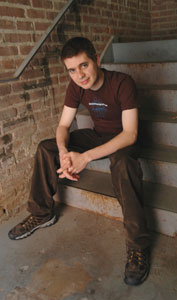HIS FIRST PICTURE SHOW

Details
For an English major, using a 24p video format for grainy effect, editing on a Macintosh computer, and with a budget of $100,000, Ben Hickernell did rather well this year at the Philadelphia Film Festival. In April, the movie version of his Haverford and 2001 Fringe Festival-produced play cellar, about two former friends who wind up fiendishly trapped in someone's basement with a minimum of amenities and a gun with a single bullet in it, sold out in its debut at the Festival for Independents; then it nearly sold out the 400-seat Prince Theater, where it concluded. The buzz was good enough to spark interest at the Sundance, Tribeca and Hamptons film festivals (though dates remained unconfirmed at press time). "It was great, I've only heard good things," the upbeat Hickernell reports. "And even the mixed reviews — like the Swarthmore and Drexel papers — weren't really negative."
Most plays are "static" when transferred to cinema — even the 1953 Julius Caesar with Marlon Brando, or Sidney Lumet's 1957 Twelve Angry Men, from the Reginald Rose theater piece — but are helped by more characters and conflict possibilities. Hickernell's and Bill Dawe's cellar, which developed out of improvisational exercises with Haverford's Lighted Fools comedy troupe in 1999, had only the two characters, interacting in a combination of "realistical/fantastical" confrontations that melded some higher philosophical themes with commercial thrillerdom —" We wanted it to be an entertaining mystery," Hickernell says, from his Church Street apartment: " 'How did those two get into the cellar and how would they get out?' — but also, a kind of musing: 'Is this still life if the life I knew is still out there?' ."
Abigail Graber, who wrote the review for Swarthmore's Phoenix online student newspaper, felt the pre-life and after-life of the characters was insufficiently suggested, and that though Hickernell rewrote the theater piece to include more characters and flashbacks meant to provide a more rounded context, the static quality of theater hadn't been fully transcended by the film. "I can see what she means," Hickernell observed, "but the premise of the work was confining and restrictive. I wanted the audience to feel something outside of its own experience...at the Fringe Festival we staged cellar in the basement under AKA Records [in Old City] ." Hickernell wanted to subject audiences to the same dusty, confined, restrictive atmosphere the play's two characters, Fenton and Ned, had to endure: "People would cough down there, but afterward they would say they felt it was cool..."
cellar was co-produced with Theater Exile, an experimental Philadelphia company looking for quality film projects. Reconstruction Pictures, which is pretty much Hickernell, operating out of his Church Street pad, is seeking to form a kind of nonprofit foundation-like structure from which to produce: "Theaters have always run as nonprofits with grants from various foundations," he said. "Given costs today, and pressures for formulaic film-making, I thought it would be interesting to try to make films that way." He points out that the UK Film Council in Britain funds independents with the proceeds of the National Lottery, and there have been some precedents in Europe, but not many here. "It's a little tough," he admits. "Film people aren't looking for nonprofit sources, and the foundations that fund theaters aren't looking to back films, so far." But he's hopeful.
In 2003, Hickernell took a break from directing and acting to work with a New York City production company called This is That, best known for movies like 21 Grams and Eternal Sunshine of the Spotless Mind. He saw that New York was becoming an antidote for the compulsive feverishness of Hollywood, with young producers working against the grain to produce idiosyncratic movies that try to get at something besides max profit-taking: "But don't get me wrong. I have nothing against making commercial successes...I was an English major at Haverford who wrote my thesis on film, first one to do so...It was on Terrence Malick's film The Thin Red Line" [Ben was actually president of the Haverford Moviemakers' Club]. " Bill [ Dawe] and I were working on improv scenes, meeting weekly with Kim and Sue Benston, exploring possibilities down in 'the crypt' in the Music Building, you know? We'd thought of something, a situation, completely outside our experience...we'd rehearse it in there, and soon connections and lines of direction began to evolve into cellar."
Bill Dawe is now a teacher in Malvern, engaged and "settling down," according to Hickernell, but Ben is working off cellar's success to shoot another movie. This time it will be more "artistically opened-up," a "family drama" with a "message" and some "comedy," and will have a budget of $150,000: "You might wanta say that we put most of our cash toward paying the actors and crew — everybody gets paid — rather than spending it on technical equipment...Maybe some of those Haverford alumni might like to invest?..."



